|
|
|
Sort Order |
|
|
|
Items / Page
|
|
|
|
|
|
|
| Srl | Item |
| 1 |
ID:
132233
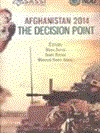

|
|
|
|
|
| Publication |
Islamabad, SASSI and NDU, 2013.
|
| Description |
xix, 442p.Pbk
|
| Standard Number |
9789699921
|
|
|
|
|
|
|
|
|
|
|
|
Copies: C:1/I:0,R:0,Q:0
Circulation
| Accession# | Call# | Current Location | Status | Policy | Location |
| 057813 | 958.1047/SUL 057813 | Main | On Shelf | General | |
|
|
|
|
| 2 |
ID:
131111
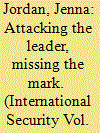

|
|
|
|
|
| Publication |
2014.
|
| Summary/Abstract |
Leadership targeting has become a key feature of counterterrorism policy. Both academics and policymakers have argued that the removal of leaders is an effective strategy in combating terrorism. Leadership decapitation is not always successful, however, and existing empirical work does not account for this variability. A theory of organizational resilience explains why decapitation results in the decline of some terrorist organizations and the survival of others. Organizational resilience is dependent on two variables: bureaucratization and communal support. Older and larger organizations tend to develop bureaucratic features, facilitating a clear succession process and increasing their stability and ability to withstand attacks on their leadership. Communal support plays an important role in providing the resources necessary for terrorist groups to function and survive. Religious and separatist groups typically enjoy a high degree of support from the communities in which they operate, and thus access to critical resources. Application of this theoretical model to the case of al-Qaida reveals that Osama bin Laden's death and the subsequent targeting of other high-level al-Qaida operatives are unlikely to produce significant organizational decline.
|
|
|
|
|
|
|
|
|
|
|
|
|
|
|
|
| 3 |
ID:
164102


|
|
|
|
|
| Publication |
New Delhi, Pentagon Press, 2019.
|
| Description |
xxxvi, 264p.hbk
|
| Standard Number |
9789386618818
|
|
|
|
|
|
|
|
|
|
|
|
Copies: C:2/I:0,R:0,Q:0
Circulation
| Accession# | Call# | Current Location | Status | Policy | Location |
| 059600 | 303.625/PAN 059600 | Main | On Shelf | General | |
| 059601 | 303.625/PAN 059601 | Main | On Shelf | General | |
|
|
|
|
| 4 |
ID:
130692
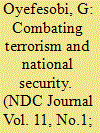

|
|
|
| 5 |
ID:
080542
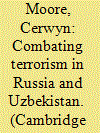

|
|
|
|
|
| Publication |
2007.
|
| Summary/Abstract |
This article aims to offer a preliminary assessment of Russian and Uzbek attempts to combat terrorism after 9/11. While both cases fit into the larger post-Soviet political narrative, itself shaped by strategic realignments following the events of 9/11, relatively little work has been undertaken to analyse how terrorism and law enforcement have intertwined in order to generate military, legislative and police responses in these countries. Thus, while recognizing how security policies changed in Russia and Uzbekistan immediately after 9/11, this paper argues that policy reactions to home-grown terrorism have, for the most part, continued to be the main driving force behind attempts to combat terrorism. Equally, however, the latter part of this paper argues that a more nuanced account of security in the North Caucasus and Central Asia is needed in order to study terrorism effectively. In particular, the emergence of suicide terrorism in Russia and Uzbekistan raises important issues, not just about post-9/11 law enforcement, but also identity politics, illustrating how diverse local, regional and international forms of identification shape International Relations theory
|
|
|
|
|
|
|
|
|
|
|
|
|
|
|
|
| 6 |
ID:
112879
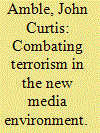

|
|
|
|
|
| Publication |
2012.
|
| Summary/Abstract |
Since the 1990s, jihadist terrorists have leveraged the power of the Internet in more imaginative ways than state security services charged with countering them. Terrorist groups are now harnessing the unique characteristics of the new media environment that has taken shape in the past decade, while security services struggle to conceptualize this rapidly evolving virtual landscape. But new media offers unique opportunities to these services, particularly intelligence agencies, to confront the terrorist threat. Identifying and exploiting these opportunities, both strategic and tactical, will lend critical advantage to governments in their worldwide confrontation with global jihadists.
|
|
|
|
|
|
|
|
|
|
|
|
|
|
|
|
| 7 |
ID:
114206
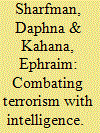

|
|
|
| 8 |
ID:
130254
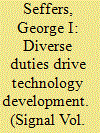

|
|
|
| 9 |
ID:
175582
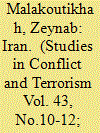

|
|
|
|
|
| Summary/Abstract |
Iran has a longstanding connection with terrorism, in particular after the 1979 Islamic Revolution. It has been recognized as both a victim and state sponsor of terrorism, but has predominantly been accused of supporting terrorism worldwide. Iran has been accused of training, financing, and providing weapons and safe havens for nonstate militant actors, such as Hezbollah and Hamas. While Iran considers such groups as national liberation movements, they are by contrast designated as terrorist groups according to other countries. At the same time, Iran has suffered from terrorist attacks, although Iranian security has proven much superior to its neighbors, such as Iraq, Syria, and Afghanistan. Regardless of claims relating to Iran as a victim or sponsor of terrorism, no official policy or document has been published by the government by way of a counterterrorism policy because any stated policy would be subject to accountability, human rights, and the rule of law. In practice, its focus is placed on the “War by Terror” as an external instrument as opposed to internal “Counterterrorism.” By analysis of official documents, statements, and laws, both Persian and English sources, this article aims to clarify Iran’s counterterrorism policy and framework and the actual practices of Iran in the Middle East.
|
|
|
|
|
|
|
|
|
|
|
|
|
|
|
|
| 10 |
ID:
088377
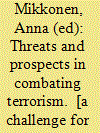

|
|
|
|
|
| Publication |
Helsinki, National Defonse Studies, 2009.
|
| Description |
82p.
|
| Standard Number |
9789512520008
|
|
|
|
|
|
|
|
|
|
|
|
Copies: C:1/I:0,R:0,Q:0
Circulation
| Accession# | Call# | Current Location | Status | Policy | Location |
| 054226 | 303.625/MIK 054226 | Main | On Shelf | General | |
|
|
|
|
|
|
|
|
|